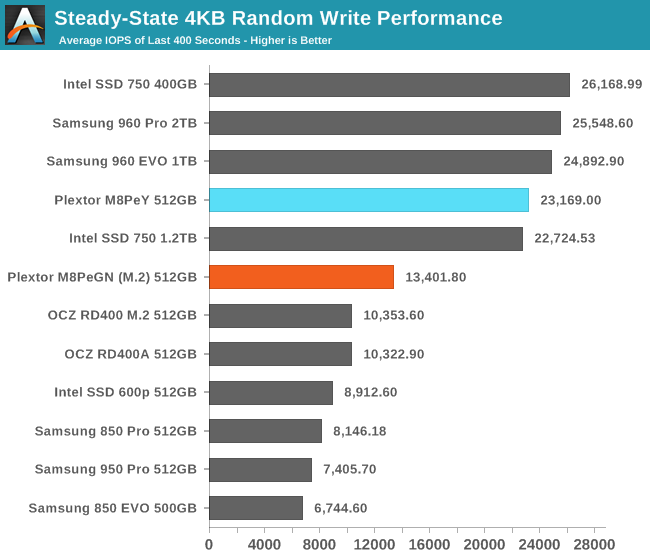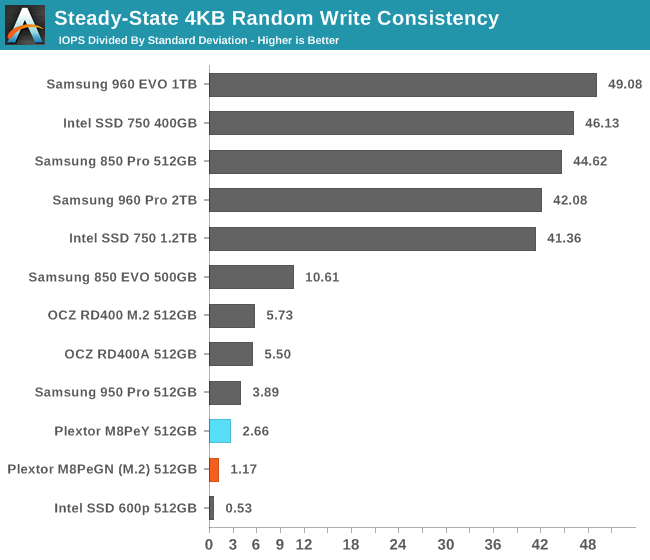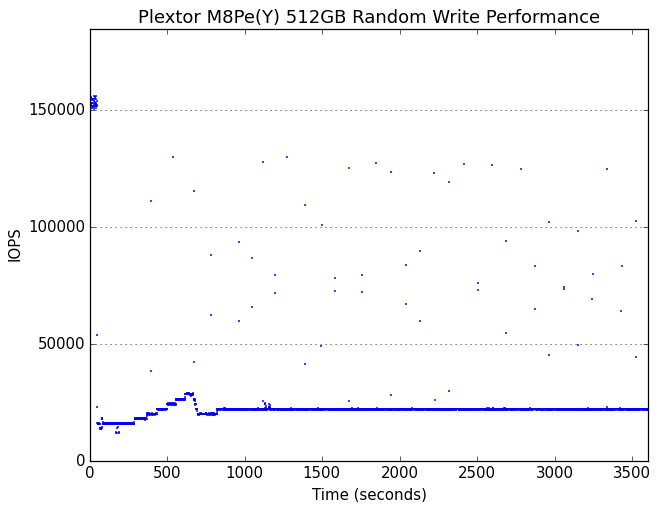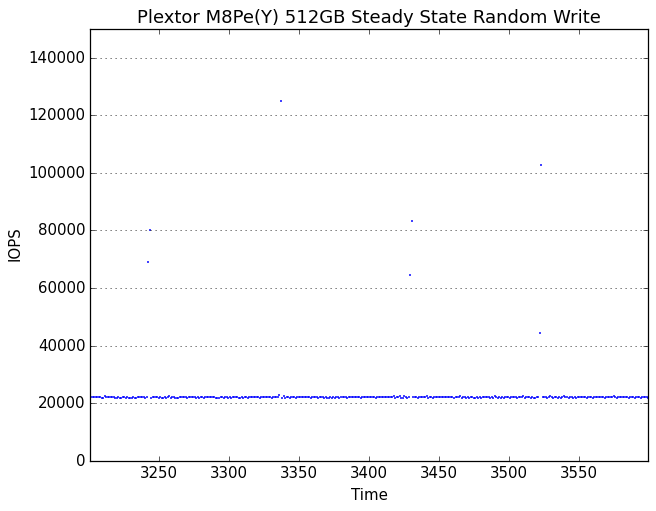The Plextor M8Pe (512GB) SSD Review
by Billy Tallis on December 14, 2016 9:00 AM ESTPerformance Consistency
Our performance consistency test explores the extent to which a drive can reliably sustain performance during a long-duration random write test. Specifications for consumer drives typically list peak performance numbers only attainable in ideal conditions. The performance in a worst-case scenario can be drastically different as over the course of a long test drives can run out of spare area, have to start performing garbage collection, and sometimes even reach power or thermal limits.
In addition to an overall decline in performance, a long test can show patterns in how performance varies on shorter timescales. Some drives will exhibit very little variance in performance from second to second, while others will show massive drops in performance during each garbage collection cycle but otherwise maintain good performance, and others show constantly wide variance. If a drive periodically slows to hard drive levels of performance, it may feel slow to use even if its overall average performance is very high.
To maximally stress the drive's controller and force it to perform garbage collection and wear leveling, this test conducts 4kB random writes with a queue depth of 32. The drive is filled before the start of the test, and the test duration is one hour. Any spare area will be exhausted early in the test and by the end of the hour even the largest drives with the most overprovisioning will have reached a steady state. We use the last 400 seconds of the test to score the drive both on steady-state average writes per second and on its performance divided by the standard deviation.

The heatsink makes a huge difference in the sustained random write performance of the M8Pe. With the heatsink, the M8Pe is competitive with the Intel 750 and the Samsung 960 Pro and EVO. Without the heatsink, the M8Pe is slower by almost 10k IOPS, but still above average for consumer SSDs, including some of the NVMe competition.

The M8Pe's consistency scores are quite low, indicating that it lacks the tight regulation of Samsung and Intel's best drives that have similar average performance.
 |
|||||||||
| Default | |||||||||
| 25% Over-Provisioning | |||||||||
The second by second performance plot reveals that the apparently low consistency is on the M8PeY due entirely to occasional outliers of extremely high performance; most of the time the M8PeY is operating at a very consistent ~22k IOPS, and none of the outliers fall below that level. The M8PeGN without a heatsink or heatspreader suffers from frequent periods of thermal throttling and slightly lower performance when not throttled. The lower performance also causes the M8PeGN to take slightly longer to reach steady state.
 |
|||||||||
| Default | |||||||||
| 25% Over-Provisioning | |||||||||
With a heatsink, the M8Pe's steady state hovers around 22k IOPS, but without the heatsink it alternates between 18k IOPS and a thermally throttled 2400 IOPS. Fortunately, it spends more time in the high-performance state than the low performance state, and there are still a few of the extreme outliers above 100k IOPS.
The M8Pe responds very well to extra overprovisioning. The variability is increased slightly, but the performance with the heatsink jumps to 90-100k IOPS sustained. Without a heatsink, the steady state only increases to 60-65k IOPS, but the drive spends much less time thermally throttled and the performance in that state increases to about 6800 IOPS. It's no surprise that the Marvell 88SS1093 controller has been a popular choice for enterprise M.2 PCIe SSDs.










64 Comments
View All Comments
Magichands8 - Wednesday, December 14, 2016 - link
This is amazing! Tiny 128GB SSDs for $0.64/GB! And look at that 1TB for $0.51/GB! We even get to use a crappy Microsoft bundled driver for these! Who knows, in 2017 we may even get to see consumer SSDs reach $0.80, $0.90 or even $1+ per GB... Time doesn't stand still and neither does the endless march of progress. Brace yourselves guys, the future's going to be an amazing place.ironwing - Thursday, December 15, 2016 - link
What is a the reason that PCIe SSDs consume more power than SATA SSDs? Is it simply the higher speeds? The review covered the sleep state issues with the PCIe drives but when the drives are in a similar state, the SATA drives appear to be much more power efficient.Billy Tallis - Thursday, December 15, 2016 - link
I think the biggest problem is that the NVMe power saving states I'm testing don't include reducing the PCIe link speed or width. Keeping a PCIe 3.0 x4 link lit up takes a significant amount of power. The SATA drives by contrast are being told to put the SATA link in a low power state and take that as the signal to engage internal power saving mechanisms.bbhaag - Thursday, December 15, 2016 - link
Thanks for the great review Billy. I've been holding off on buying the Plextor for my new build hoping that Anandtech would put up a review and you guys delivered. Looks like they are solid drives at a mediocre price point. I knew I should have bought the 512 version when the egg had it for 179...sigh...oh well I can wait.DigitalFreak - Thursday, December 15, 2016 - link
$50 price difference for a heatsink? Really?Bruce427 - Friday, December 16, 2016 - link
I think that price includes a PCIe card as well.Bruce427 - Friday, December 16, 2016 - link
At first glance at published specks, it appears that the New Corsair MP500 NVMe drive may outperform the PlextorM8Pe for about the same price.Bruce427 - Friday, December 16, 2016 - link
Sorry, spell check got me. That should have been "specs."Bruce427 - Friday, December 16, 2016 - link
"specs"Billy Tallis - Friday, December 16, 2016 - link
The Corsair MP500 uses the Phison E7 controller. Next week I should have a review up of the Patriot Hellfire that is essentially the same drive. It's slower than the M8Pe on almost every test.